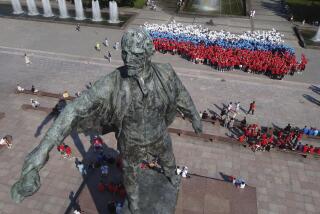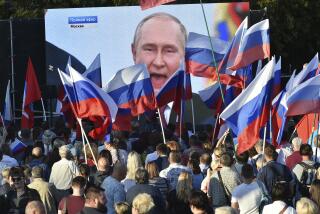How to React When the Empire Has No Clothes : Russia: A weak federation presents the West with far more difficult policy dilemmas than yesterday’s strong Soviet state.
- Share via
The most obvious lesson of the Chechnya catastrophe is that Russia is entering 1995 as an extremely weak state in many meanings of that word. Many of these weaknesses have existed for some time, but have never been illustrated as vividly as during the past few weeks.
First, Russia has now revealed its weakness in the territorial sense of the word: There are many areas of the Russian Federation to which Moscow’s writ extends either barely or not at all. The line that has been followed by the Russian government with respect to the many restive republics (and various other increasingly assertive regions) for the past year or two has much in common with the old Soviet workers’ joke: “They pretend to pay us and we pretend to work.”
In this case, Moscow pretended that it still had some semblance of control over its giant territory, while the regions pretended to pay taxes. The ruling Chechen elites, for instance, were able to pretend that they had achieved the republic’s independence (and to reap the political benefits thereof), while the ruling Russian elites seemed content with the fact that no other country had recognized Chechnya’s independence, allowing them to keep up appearances as well.
Now that both sides have called each other’s bluff, both are likely to lose, and the new harder line coming from Moscow does not bode well for the future.
The 89 constituents of the Russian Federation are an extremely heterogeneous group, with radically different natural endowments, ethnic mixes, geopolitical locations and other interests. Until recently, the central authorities had displayed a surprising amount of diplomatic skill (and had also expended significant amounts of political and economic capital) to strike a delicate balance between these extremely divergent interests. All of this will now be jeopardized by the emerging hardhanded policy of the Russian Security Council.
Second, the central government apparatus is extraordinarily fragmented, as are its instruments of power. Decision-making procedures in most countries are probably far more chaotic than the public in general surmises. Bureaucratic infighting, for instance, is certainly a worldwide occurrence, frequently with far-reaching consequences for policy-making. Yet the simultaneous transformations Russia is undergoing seem to give the Russian variant of this phenomenon a distinctly unique quality.
Here again, the pictures that are reaching us from Grozny clearly suggest a degree of disintegration of the traditional levers of power that has reached critical proportions. Where else can overt military insubordination, as we have witnessed repeatedly over the past couple of weeks in Chechnya with television cameras running, take place virtually without any consequences for either the higher officers involved or for the minister of defense? Where else would the fairly classical competition between secret services and professional military, or between factions within the military itself, be allowed to take such grotesque proportions? The picture of the central decision-making process that emerges from the Chechnya crisis is one of profound institutional paralysis at all levels of government.
Third, the Russian Federation is weak in the political-economic sense, in that it is thoroughly permeated by powerful interest groups. We have yet to start mapping the new political economy of Russia, but it is clear that there are a number of key actors that either have captured the decision-making process in certain areas, or are able to influence these areas in ways that would be unthinkable in most Western countries.
“Special interests” and “lobbying” are terms that have a familiar ring. But in the West, these various interests typically pass through fairly effective “filters” of interest aggregation like political parties or parliamentary committees. In Russia, special interests are able to directly--and often effectively--lobby the executive.
This trend is particularly visible in the current decision-making process on the Russian budget, but probably also plays a role in the Chechnya war, where a number of interest groups--certainly fuel and energy--are directly affected.
The weakness of the Russian state should not necessarily be a cause for alarm in the West. The devolution of power away from the central authorities is certainly a positive development, which will most likely go into history as one of the most important achievements of Russia’s first democratically elected president.
This devolutionary process is also reshaping Russia into a more “normal” neighbor with whom it will ultimately be easier to cooperate. What the West needs, then, is not alarmism but a healthy injection of realism. In trying to reimpose order in a restive outpost at the periphery of the Russian state, the Russian center is finally showing its real face, which is not that of an aspiring, vigorous hegemonist, but rather that of a very scantily clad emperor. We may soon find out that today’s weak Russia presents the West with far more difficult policy dilemmas than yesterday’s strong Soviet state--or than the strong neo-imperial Russian state that the pundits would like to invent.
More to Read
Sign up for Essential California
The most important California stories and recommendations in your inbox every morning.
You may occasionally receive promotional content from the Los Angeles Times.










